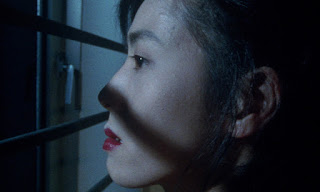新宿黒社会 チャイナ マフィア戦争
Shinjuku kuroshakai: Chaina mafia sensô
Takashi Miike, 1995, Japan
“Actually, I am a lazy person,” says Takashi Miike, the man whose video, cinematic and TV output is legendarily prolific. Certainly not when it comes to filmmaking. Between 1991 and 1995, IMB lists that he had already made twelve straight-to-video and TV films before this, his first theatrical release, so perhaps it is no surprise that ‘Shinjuku Triad Society’ comes as a practically fully formed Miike, full of the touches that would define his cinema. The melting pot vibe that runs through Miike’s films seems to erupt from the basis that it’s all been done before, that we know all the tropes and so let’s go mixing things up a little.
The opening to ‘Shinjuku Triad Society’ is not quite as fevered as ‘Dead or Alive’, but it works up a similar appetite of expectation with its cuts between several incidents and letting the audience find its own way in by recognising the tropes it is working with. A nude man on a bed, a hustler, a throat slashing, an invasive strip search, all before the credits. And, like ‘Dead or Alive’, ‘Shinjuku Triad Society’ then settles into that oddball melancholy that characterises Miike’s work. It is this trait that has come to strike me most upon second viewings of his films. Like many in the West, it was ‘Audition’ and ‘Ichi the Killer’ that introduced me to Miike, then ‘Visitor Q’, so it was truly only when I saw ‘Rainy Dog’ that I sensibly saw past just the shock value and was fully aware of how focused on the downbeat he was. It’s an unhappy chaos. The first time, you just have to go with the ride as with scene-to-scene there are tonal shifts and quirks that keep you a little disorientated.
This carefully controlled balancing act of provocation and an underworld characterised by resignation and doom is what keeps a constant draw of fascination. Typically, ‘Shinjuku Triad Society’ is peppered with the violent, the outrageous, the despondent and the grim. But Miike offers the offensive and the empathetic in equal measure so buy the time we get to the rape-by-salaryman, we are already in a heady confusion of the bleak and the transgressive. This is the first of Miike’s ‘Black Society’ trilogy, followed by ‘Rainy Dog’ and ‘Ley Lines’ which all focus on social rejects as antiheroes. There’s no one really to root for as you have the Triad on the one side, battling over turf and business, and on the other there’s our protagonist Detective Kiriya (Kippei Shina), who is guilty of brutality and rape and only gets to do what a cop has to do by – and isn’t this always the way? – going untamed and off the grid. Established as abhorrent, Kiriya then embarks upon a principled quest to save his brother from falling in with an unstable gang leader, which follows a trail of gang war and organ trafficking.
Miike and writer Ichirô Fujita offer as much a portrayal of the underclass of crime as ‘City of God’ or ‘Gommorah’, but this is not so obviously neo-realistic because the tone is so offbeat. Each scene has a little idiosyncrasy that seems offhand, even goofy, but informs and speaks to a wider context. Like a gang leader defiantly exposing himself to his rivals as an act that is simultaneously eccentric, excessive, and confronting the machismo that defines the Triad world. But it should be noted that this is a gangland drama very much defined by homosexuality, and this alone criticises that macho realm/genre. Michael Mann this isn’t, and the angst here is more freaky than whiny.
And yet Miike has weird sympathy for the grotesques and
warped ones of this most depraved context. One detail that stands out across
this ‘Black Triad’ series is that the protagonists exist between Japanese and Chinese
cultures, being mixed-race or/and displaced, but at home in neither and vulnerable
to prejudice. It’s a theme that runs throughout his work. There’s slim room for
morals or betterment – although it does depend on which Miike you are watching.
It’s the sad and outrageous world for outsiders.




No comments:
Post a Comment